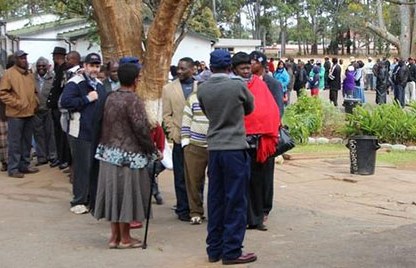The dust is yet to settle in Zimbabwe after Robert Mugabe was re-elected for the eighth time amidst serious suspicions of widespread vote-rigging. Morgan Tsvangirai’s Movement for Democratic Change (MDC) is talking tough. Civil society wants answers. Meanwhile, people are getting edgy and for many the question is: What will happen next?
There is contention over whether the harmonized elections were in fact free and fair. One member of Zimbabwe’s Electoral Commission resigned citing irregularities in the voting process. Many fear that the country might disintegrate into chaos as the re-election of ZANU PF caused divisions among people. The memory of the 2008 election has people scared of what could happen if political parties remain in contestation over the election results: some people are preparing for the worst, withdrawing their money from banks and buying up food supplies in grocery shops. Whilst there are few reports of violence thus far, repression and the memory of violence are real.
“We do not want another violent engagement. We can’t imagine another 2008. We knew that it would be hard for the opposition to rule this country. It will never happen. The regime has a tight grip over the governance of the country and they know all the tricks to rig votes. Rather rule than let us face another 2008.” ~ Market Woman
In times of political and economic instability, women bear the brunt of struggles to survive – searching for bread, water, and medicines. It has taken nearly six years for the country to stabilize. The space to dream, let alone organize for change shrinks as repression, surveillance, arrests, and fear dominate women’s lives.. Safety and security are not merely crucial concerns for women activists during election time, but are daily realities.
“So where do women go from here? Safety and security will be ongoing issues for women for a long time to come. ZANU PF has always been subtle in its limitations of freedoms. Now we see a growing conservatism, the rise of religious fundamentalism, and the space provided for hate speech. Ultimately the biggest impact is on women and women’s rights. Women are not free to walk on the streets at night, women are not safe in church, women are not safe in schools – it is not just about the direct and obvious violence perpetrated against women – it is more subtle and dangerous. It is about girls getting suspended from school for being ‘lesbians’. It is about the rape of sex workers in prisons. It is about the denial of medication to women who have been arrested. It is about the dehumanizing of female politicians in parliament. It is about the expulsion of women from jobs because they are pregnant. All of this speaks to the erosion of women’s rights—the marginalization of certain women and attempts to control women’s bodies. Under this new two-thirds majority government—who knows?” ~ Sian Maseko, Director of the Sexual Rights Centre
Women activists have been thinking about and building strategies to ensure safety and security on the ground. During the run up to the elections, the Harare Women’s Situation Room advocacy cluster comprised of the Women’s Coalition of Zimbabwe, the Zimbabwe Women Lawyers Association, and Women in Politics Support unit convened five provincial-based workshops on women peace building and conflict management. In Bulawayo, Zimbabwe’s second largest city, 12 organisations representing a range of different sectors (media, socio-economic justice, youth, constitutional and human rights, women’s rights, and faith-based organisations), including the Sexual Rights Centre, Women of Zimbabwe Arise (WOZA), Women in Leadership Development, and the Christian Alliance came together to convene a similar situation room. The strategy is one that has been used in countries like Kenya, building a safe space to gather and collate data obtained by election observers on the ground, particularly incidents of violence or electoral irregularities. The situation rooms also had a rapid response mechanism with professional personnel ready to provide medical, legal, and psychological and shelter services to abused women
While these efforts go a long way in a context that demands women activists develop responsive and agile strategies to tackle the many layers of violence at play, they are not enough. JASS’ Heart—Mind—Body strategy aims to sustain and build networks of activists rooted in the politics of self-care, who can use tried-and-tested methodologies in their work and outreach. This is necessary to ensure that a diverse and growing body of Zimbabwean women have not only the support and skills they need to organize for protection, but also the collective power necessary to demand representation where decisions are being made that will affect their safety.
Photo credit: Amnesty International


























